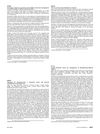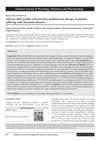 162 citations,
August 2002 in “Survey of Ophthalmology”
162 citations,
August 2002 in “Survey of Ophthalmology” Latanoprost can make eyelashes longer, thicker, and darker.
 86 citations,
December 2001 in “Experimental dermatology”
86 citations,
December 2001 in “Experimental dermatology” Mutant mice help researchers understand hair growth and related genetic factors.
 70 citations,
July 2020 in “Pharmacological Reports”
70 citations,
July 2020 in “Pharmacological Reports” Cepharanthine, a Japanese hair loss drug, shows promise as a COVID-19 treatment but needs more testing.
 16 citations,
December 2006 in “Expert Review of Dermatology”
16 citations,
December 2006 in “Expert Review of Dermatology” Hair follicles are essential for skin health, aiding in hair growth, wound healing, and immune function.
 1 citations,
March 2014 in “Journal of The American Academy of Dermatology”
1 citations,
March 2014 in “Journal of The American Academy of Dermatology” Hair care practices and concerns about maintaining hairstyles can reduce how often African American women exercise.
 June 2021 in “Journal of emerging technologies and innovative research”
June 2021 in “Journal of emerging technologies and innovative research” Onion and Aloe vera can help protect hair from damage caused by hair dyes.

A boy on a ketogenic diet and anti-epileptic drugs developed skin issues due to stopping vitamin supplements, which improved with proper supplementation.
 July 1996 in “Annals of Internal Medicine”
July 1996 in “Annals of Internal Medicine” Long-term high-dose fluconazole can cause reversible hair loss.
 165 citations,
June 2007 in “European Journal of Cell Biology”
165 citations,
June 2007 in “European Journal of Cell Biology” Hair follicle stem cells are key for hair and skin regeneration, can be reprogrammed, and have potential therapeutic uses, but also carry a risk of cancer.
 26 citations,
October 2011 in “International Journal of Biological Macromolecules”
26 citations,
October 2011 in “International Journal of Biological Macromolecules” Some newly made compounds are promising for treating enlarged prostate, hair loss, viruses, and prostate cancer, and might be better than current drugs.
 10 citations,
April 2019 in “Environmental Science and Pollution Research”
10 citations,
April 2019 in “Environmental Science and Pollution Research” Eating selenium-rich rice improved antioxidant activity and signs of aging in mice.
 8 citations,
September 2016 in “Asian journal of beauty & cosmetology”
8 citations,
September 2016 in “Asian journal of beauty & cosmetology” Dendropanax morbifera leaf extract could be good for hair growth and cosmetic products because of its antioxidant properties and growth factor effects.
 6 citations,
November 2018 in “Journal of Critical Care”
6 citations,
November 2018 in “Journal of Critical Care” Many survivors of critical illness, especially those with sepsis, experience hair loss.
 4 citations,
February 2022 in “Journal of Cosmetic Dermatology”
4 citations,
February 2022 in “Journal of Cosmetic Dermatology” Monocytes might be linked to hair loss after COVID-19.
 May 2024 in “International Journal For Multidisciplinary Research”
May 2024 in “International Journal For Multidisciplinary Research” The herbal hair cream helps protect and improve hair health.
3 citations,
December 2021 in “Frontiers in Pharmacology” Ficus benghalensis leaf extracts can effectively promote hair growth and inhibit hair loss.
 January 2023 in “Mastology”
January 2023 in “Mastology” Hormone therapy for breast cancer often leads to sexual issues like vaginal dryness and decreased libido.
 1 citations,
June 2021 in “Case reports in gastrointestinal medicine”
1 citations,
June 2021 in “Case reports in gastrointestinal medicine” Using camphorated and mentholated chlorophenol in dental treatments can lead to severe gastrointestinal issues and hair and nail loss.
 November 2023 in “Clinical, Cosmetic and Investigational Dermatology”
November 2023 in “Clinical, Cosmetic and Investigational Dermatology” Saw palmetto extract reduced hair loss and improved hair growth in people with hair thinning.
 January 2023 in “National journal of physiology, pharmacy and pharmacology”
January 2023 in “National journal of physiology, pharmacy and pharmacology” Low-dose methotrexate is generally safe but can cause mild to severe side effects, and folic acid can reduce these risks.
 July 2021 in “IntechOpen eBooks”
July 2021 in “IntechOpen eBooks” Ginseng, especially its component ginsenosides, can promote hair growth, reduce hair loss, and potentially treat conditions like alopecia by affecting cell pathways and cytokines.
15 citations,
March 2022 in “Acta Biomaterialia” The new 3D bioprinting method successfully regenerated hair follicles and shows promise for treating hair loss.
 12 citations,
May 2023 in “EMBO reports”
12 citations,
May 2023 in “EMBO reports” High mTORC1 activity slows hair growth and causes it to lose color.
 12 citations,
January 2018 in “Journal of Drug Delivery Science and Technology”
12 citations,
January 2018 in “Journal of Drug Delivery Science and Technology” The new particle system could be a promising treatment for diseases related to the 5-α reductase enzyme.
 4 citations,
January 2018 in “Elsevier eBooks”
4 citations,
January 2018 in “Elsevier eBooks” Hormones are crucial for regulating body functions and imbalances can lead to health issues.
 May 2023 in “Frontiers in Immunology”
May 2023 in “Frontiers in Immunology” Treg cell-based therapies might help treat hair loss from alopecia areata, but more research is needed to confirm safety and effectiveness.
 28 citations,
March 2017 in “Scientific Reports”
28 citations,
March 2017 in “Scientific Reports” Minoxidil may protect nerves and improve hair quality during paclitaxel treatment.
 November 2024 in “International Journal of Molecular Sciences”
November 2024 in “International Journal of Molecular Sciences” Nanoparticles may improve caffeine delivery for hair growth, offering a potential alternative to minoxidil for hair loss treatment.
 86 citations,
October 2005 in “Experimental Dermatology”
86 citations,
October 2005 in “Experimental Dermatology” The Foxn1 gene mutation causes hairlessness and immune system issues, and understanding it could lead to hair growth disorder treatments.
 25 citations,
September 2014 in “Biological Research”
25 citations,
September 2014 in “Biological Research” Arctiin helps protect hair cells from damage and death caused by oxidative stress.




























